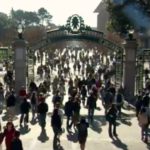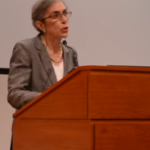Wilson, Du Bois, and Who is Worth Honoring
 Guest blogger Jonathan Marks teaches political philosophy at Ursinus College.
Guest blogger Jonathan Marks teaches political philosophy at Ursinus College.
Corey Robin, a professor of political science at Brooklyn College, concludes a recent piece in Salon by imagining how Princeton might distance itself from its former president, Woodrow Wilson. The Black Justice League there demands that the university “publicly acknowledge the racist legacy of Woodrow Wilson” and that “steps be made to rename Wilson residential college, the Woodrow Wilson School of Public Policy and International Affairs, and any other building named after him.” Critics of the BJL have argued that the BJL is attempting to erase the past, but Robin responds that it would be simple enough to stop honoring Wilson without closing the door to reflection on the past. For example, one could, Robin suggests, put a plaque on the renamed Wilson school that says this:
“This building was once named after Woodrow Wilson in honor of his achievements as president of Princeton, governor of New Jersey and president of the United States. In 2015, after lengthy campus discussions of Wilson’s racial policies — including his decision to segregate the federal bureaucracy — the university decided to remove his name from this building and to rename it the W.E.B. DuBois School of Public and International Affairs, in honor of Wilson’s most formidable critic on matters of race.”
Robin is right about at least one thing: refusing to honor someone when he does not deserve to be honored is not erasing the past. But his choice of W.E.B. Du Bois as the figure to replace Wilson shows how tricky this issue of honoring someone is for colleges and universities.
Du Bois was a pioneer in the study of African and African-American culture. But the particular characteristics that Du Bois ascribes to his race and its cultural productions in the Souls of Black Folk, including sensuality, wildness, and simplicity, appear nonetheless to be little more than the characteristics racists attributed to black people and others they regarded as primitives, now given a positive valence. Du Bois is also no stranger to the eugenics of his time and in his “Talented Tenth Memorial Address” of 1903 proposes a program of voluntary eugenics, including “deliberate planning of marriages, with mates selected for heredity, physique, health, and brains.” Why should Princeton honor a man who so absorbed the prejudices of his period that they infected even his attempts to save the world from prejudice?
Du Bois was a founder of the NAACP, but he ultimately abandoned it for a politics so radical that it could see little or nothing wrong in the rule of Josef Stalin. Du Bois’s 1954 piece, “On Stalin” was, as his biographer David Levering Lewis says, “an apostrophe to the dead dictator . . . that would have flattered the memory of Abraham Lincoln.” Although Du Bois was not the only person of the left to be taken in by Stalin, he continued to support Stalin after his crimes were so evident that nearly everyone on the left had to concede them. The “revelations in February 1956 of Stalin’s crimes left [Du Bois] publicly unmoved.” He joined the American Communist Party in 1961. Here is Lewis again: “neither communism’s doctrinal rigidities nor the Soviet Union’s 1956 rampages in Eastern Europe would shake Du Bois’s commitment to world socialism . . . . [For] the sake of underdeveloped peoples everywhere, all tactics that contained American capitalism were fair.” Why should Princeton honor a figure who refused to see or excused the crimes of the Soviet Union, even those perpetrated under Stalin? Du Bois also allowed himself to be used for propaganda purposes by a Chinese regime whose policies had already killed millions. He met Chairman Mao on a visit to China in 1959, and a journalist who visited Du Bois in 1963, the last year of Du Bois’s life, spotted a bust of Mao, alongside Marx and Lenin, in Du Bois’s home.
Du Bois’s The Souls of Black Folk draws on Du Bois’s work as a social scientist and, though it includes emotional appeals, nonetheless is written to an audience that Du Bois thinks can listen to reason. But later in his career, in part under the influence of Freud, Du Bois comes to think that, as he says in his 1940 work, Dusk of Dawn, “carefully planned and scientific propaganda” is needed to move people influenced by “conditioned reflexes . . . long followed habits, customs and folkways . . . subconscious trains of reasoning and unconscious nervous reflexes.” Why should Princeton University, which puts so much stock in reason, honor a man who, with his eyes open, left his academic career to take up the work of a propagandist?
Finally, although Du Bois became a formidable critic of Wilson on matters of race, he was among Wilson’s most enthusiastic supporters when Wilson ran against Taft and Roosevelt. Apparently Du Bois did not take the time to find out what every Princeton freshman is now supposed to know, that Wilson’s entire career was defined by racism. Why should a Princeton purged of Wilson honor a man who so grossly misjudged Wilson?
As Geoffrey Stone’s recent Huffington Post piece argues, there is a strong case to be made for honoring Wilson, perhaps as strong a case as can be made for honoring Du Bois, that apologist for Stalin, that abandoner of the civil rights movement and his country (Du Bois renounced his U.S. citizenship and became a citizen of Ghana in 1963). But my point is not that Du Bois, whom I teach regularly and whom I think worthy of great praise, should be excluded along with Wilson from the circle of people worth honoring. Rather, I want to contest the claim made by Robin and others that the Black Justice League and its faculty supporters are doing anything much to advance our discussion of Wilson by proposing that Princeton stop honoring him, except in the sense that controversialists of all kinds tend to provoke discussion. Instead, they urge us to substitute for one set of criteria for honoring public figures, perhaps not very thoughtful, another, about equally thoughtless, set of criteria. I am not sure that the time of our students and faculties is best spent examining the names on its buildings, but insofar as they do spend their time doing it, they should strive not to honor, or dishonor, anyone thoughtlessly.




